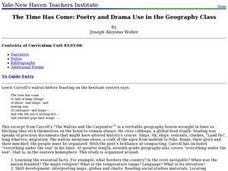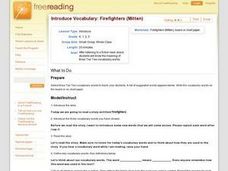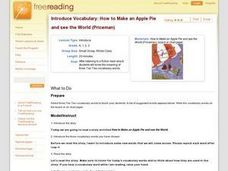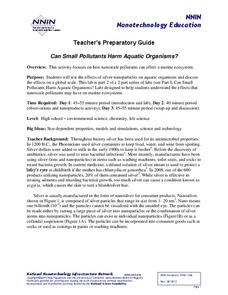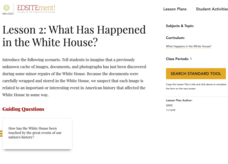Curated OER
Introduce Vocabulary: Night Shift Daddy
Young scholars explore language arts by reading a children's book in class. In this story vocabulary activity, students read the book Night Shift Daddy and identify the use of specific vocabulary words. Young scholars utilize the...
Curated OER
Time Conceptualization
Students relate the number and length of generations in their living family members to the number of generations that have passed since specific events in recorded history. They then apply this time conceptualization to the number of...
Curated OER
Literacy: Slowly, Slowly, Slowly Said the Sloth
Students explore language arts by analyzing a children's book in class. In this vocabulary lesson, students read the book Slowly, Slowly, Slowly... by Eric Carle. Students identify the characters, setting and plot of the story before...
Curated OER
Word Search
Students explore the alphabet by participating in a word activity. For this vocabulary review lesson, students practice manipulating letters in the alphabet to create five words and write them in their vocab journal. Students complete a...
Curated OER
The Time Has Come: Poetry and Drama Use in the Geography Class
Young scholars use drama and poetry in their Geography class. In groups, they role play an interviewer or the interviewee in various plays that were presented to them. In their role, they must locate and label where the countries...
Curated OER
How Does Temperature Vary Over Time?
Pupils examine the temperature flucuations on the Earth. After defining new vocabulary, they identify the flucuations of the Earth on a map. As a class, they develop a hypotheis on the temperature variation by examining the data.
Curated OER
Introduce Vocabulary: Firefighters
Learners explore language arts by reading a book with their class. In this story vocabulary lesson, students read the book Firefighters and identify the use of specific vocabulary words. Learners define the selected vocab words and...
Curated OER
Introduce Vocabulary: How to Make an Apple Pie and See the World
Students explore language arts by reading a fiction book in class. For this tier two vocabulary lesson, students read the book How to Make an Apple Pie and See the World and identify the use of specific vocabulary words. Students define...
Curated OER
Introduce Vocabulary: Tar Beach
Students explore language arts by reading a children's book in class. In this story vocabulary lesson plan, students read the book Tar Beach and discuss the setting and plot with their classmates. Students define a list of vocabulary...
02 x 02 Worksheets
Inverse Variation
Discover an inverse variation pattern. A simple lesson plan design allows learners to explore a nonlinear pattern. Scholars analyze a distance, speed, and time relationship through tables and graphs. Eventually, they write an equation to...
Curated OER
Picture This - Stars Over Hoke
The classroom becomes a safe and inclusive place for your ELLs as they create documents about their lives. Learners create, read, and present story books based on their own personal experiences. They use digital cameras to take...
EngageNY
Motion Along a Line – Search Robots Again
We can mathematically model the path of a robot. Learners use parametric equations to find the location of a robot at a given time. They compare the paths of multiple robots looking for parallel and perpendicular relationships and...
Curated OER
American Flag History
Young historians explore US culture by investigating the US flag. They will use their textbooks, prior knowledge, and sources provided by the teacher to research the history of the American flag. They will design and create a trading...
National Nanotechnology Infrastructure Network
Can Small Pollutants Harm Aquatic Organisms?
Nanoparticles have toxic effects on plant and animal life—even though you can't see them. The second lesson of a two-part series has young scientists conduct an experiment that exposes plant and animals to nanoparticle pollutants. They...
National Endowment for the Humanities
Lesson 2: What Has Happened in the White House?
Working in small groups, or individually, learners are given images of events that took place at the White House. They study the image and research that time in history to better understand how the White House has been affected by...
Purdue University
Global Design for the Seasons
People don't all get the same amount of sun at the same time of the year. Collaborative groups explore how the motion of Earth contributes to the idea in an inquiry-based STEM lesson. Learners first investigate how the rotation of Earth...
Media Smarts
Selling Tobacco
Take a look at tobacco advertising techniques through the decades. Students analyze the differences in strategies, and write an essay on the advertising history of one brand of tobacco, how tobacco advertising has changed over time, or...
EngageNY
Experiments and the Role of Random Assignment
Time to experiment with mathematics! Learners study experimental design and how randomization applies. They emphasize the difference between random selection and random assignment and how both are important to the validation of the...
EngageNY
Margin of Error When Estimating a Population Mean (part 1)
We know that sample data varies — it's time to quantify that variability! After calculating a sample mean, pupils calculate the margin of error. They repeat the process with a greater number of sample means and compare the results.
Columbus City Schools
Experiencing Eclipses
Don't be caught in the dark! Young scientists investigate the causes of both solar and lunar eclipses using an interactive to help them understand the development of an eclipse over time. They then research facts and characteristics of...
Cornell Lab of Ornithology
Life In A Nest: Exploring Life Cycles With Bird Cams
Why read about it when you can watch it happen? Bird cams make it possible for learners to experience the life cycle of a bird in real time! An engaging set of lessons provides activities to connect their learning to bird cam...
Beyond Benign
What is Biotechnology
Examine the sequence of key events in the history of genetics. An engaging lesson asks scholars to sort events to create a timeline of biotechnology milestones. Arranging the events gives learners a perspective on the development of...
Science Matters
Heart to Heart
It's time to get to the heart of the matter! After introducing the heart anatomy in the previous instructional activity in a series on the systems of the body, the instructional activity looks at the specifics. Learners complete a series...
Science Matters
Motors
It's time to get moving! The 13th lesson in a 14-part unit on electricity and magnetism explores the relationship between electricity and mechanical energy. Budding scientists build motors and experiment with different components to...
Other popular searches
- Wrinkle in Time Vocabulary
- Past Time Vocabulary
- Snack Time Words
- Past Time Words
- Grammar Time Words
- Math Time Words
- Telling Time Vocabulary
- Telling Time Words
- Prime Time Vocabulary
- French Vocabulary Time Words
- Spanish Time Vocabulary






